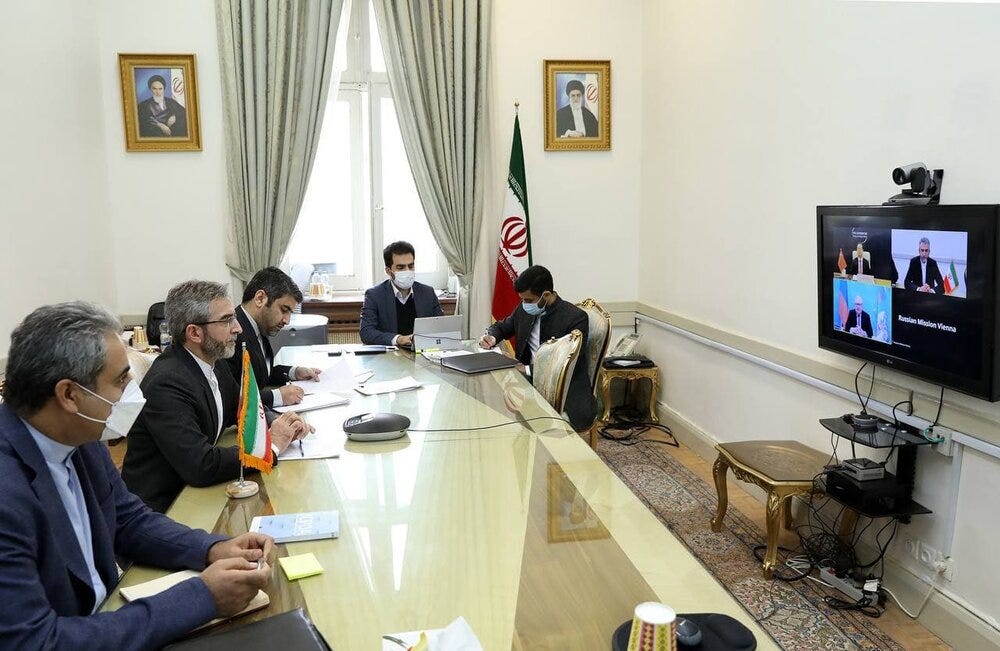Iran position still unclear going into resumed talks, diplomats say
IAEA Director-General Rafael Grossi will travel to Iran Nov. 22-23, before talks on possibly restoring full implementation of Iran nuclear pact resume in Vienna on Nov. 29.

Despite a flurry of strident public statements by Iran’s hardline new nuclear negotiator Ali Bagheri Kani when he traveled to Europe last week and then held consultations with the Russians and Chinese in recent days, diplomats going into talks with Iran later this month suggest it may take some time to clarify what the Iranian position is.
Iran has not yet been totally forthcoming with diplomatic counterparts about the details of the position it is expected to adopt at talks on possibly restoring US and Iranian full implementation of the 2015 Iran nuclear deal, due to resume in Vienna on November 29, after a five month hiatus, diplomats described this week.
One key question where there is still uncertainty, one official from a current party to the deal described this week, is whether Iran expects to pick up the talks where they left off after six rounds of talks in June, start talks from scratch, or something in between.
Another diplomat from another nation in the deal, speaking not for attribution, also suggested that, even after recent consultations, he is still unclear what the Iranian position is.
In a way, the paradox is, the Iranians say, ‘we want to go back to the JCPOA’ and ‘we want guarantees’... that are more than the JCPOA, the first official, speaking not for attribution, told Diplomatic, referring to the acronym for the formal name of the 2015 Iran nuclear deal, the Joint Comprehensive Plan of Action (JCPOA). So they need to clarify this contradiction, he said.
The official said it was striking how nine months ago, most nations agreed that the Trump administration, which quit the deal in 2018, was responsible for Iran’s decision to exceed the pact’s nuclear limits to protest the lack of sanctions relief.
Now, nine months later, the Iranians think they have built a lot of leverage, with their higher level enrichment and other breaches of the deal, the official continued. But they have also brought together countries to the view that the problem we have right now is what Iran is doing, he said.
So that will set the context for the discussions, the official said.
Ahead of the Nov. 29th seventh round of talks on possibly restoring US and Iranian full implementation of the JCPOA, International Atomic Energy Agency (IAEA) Director General Rafael Grossi will travel to Iran on Monday (Nov. 22) and meet on Tuesday (Nov. 23) with Iranian Foreign Minister Hossein Amir-Abdollahian and the head of Iran’s atomic energy organization Mohammad Eslami, the spokesman for the Atomic Energy Organization of Iran (AEOI) told Iranian journalist Akram Sharifi today (Nov. 17). Grossi’s visit also comes ahead of the IAEA Board of Governors meeting on Nov. 24-26, also in Vienna.


Bagheri Kani (or Bagheri), Iran’s deputy foreign minister for political affairs as well as new nuclear negotiator, in meetings in Europe last week, stressed that he has been made responsible for the nuclear negotiating file under the new Ebrahim Raisi administration, an expert who met with him last week said.
“There was a clear effort to communicate that a deal is possible, and that he is someone who has been made responsible for the file,” the expert said.
As for the question about whether Iran wants a return to the JCPOA, or a different deal, “I don’t think it is about a different deal,” the expert continued.
When asked about the issue of Iranian public demands for ‘guarantees’ that the US won’t leave the deal again, which the U.S. has said it cannot commit a future US president to, Bagheri responded that political guarantees are important, but are not enough. What we want to see is practical, he said.
“The point being, the guarantees issue…I would not look at it as a gambit to try to renegotiate the quid pro quo of the deal,” the expert said.
Bagheri also downplayed his past criticism of the deal, saying when he made those comments, he was speaking as an outside government policy expert; now he is a policy maker, working on behalf of the Iranian system (nezam), and his personal views don’t matter.
“We don’t know” yet what the Iranian position will be, Ali Vaez, director of the Iran program at the International Crisis Group, told Diplomatic.
“If what they want is, indeed, the wholesale lifting of every sanction imposed by Trump, guarantees that this US president and future US president will never re-impose sanctions, they are not going to get it,” Vaez said. “Then the options are limited to, ok, do we go for a ‘more for more’ deal, or do we go for a ‘less for less.’”
In a possible less for less arrangement, for instance, Iran might freeze its higher level uranium enrichment to 20% and 60%, and stop installation of advanced centrifuges, in exchange for limited sanctions relief, such as access to some of its funds in foreign banks, Vaez suggested.
“But I don’t think it is an option that will come up early on, but after a few rounds, if it becomes clear that what Iran wants is not possible,” Vaez said. “Again, it is one of the alternative options down the road. I don’t think it will come up early on.”
The option of an interim deal has not been discussed among the parties to the 2015 pact, known as the P5+1, according to a diplomatic source.
**
